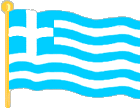Νάνι του ρήγα το παιδί
Νάνι του ρήγα το παιδί
Hush, Son of the King
Children's Song
Children's Song
(Greek)
(English)
Νάνι του ρήγα το παιδί
Του βασιλέ' τ'άγγόνι,
Που μάννα που το 'γέννησε,
Το 'χει σταυρό κι' άμόνει.
Hush, son of the king,
Grandson of the king,
Whose mother that bore him
Keeps on him a cross by which to swear.
Notes
Transliteration
Nanee too reegha to pedhee
Nanee too reegha to pedhee
Too vasseele t'angoni
Poo mana poo to yennisse
To chee stavro ke amonee
"e" like in "red"
"gh" like a voiced h, gargling
*****
Marietta wrote:
"The two last lines should be translated as 'For the mother who bore him, He is the cross and the anvil.'
The important thing in this song is that this woman loves her son very much. Her son is like the holy (cross) and as if he is the strong foundations (like the anvil for a blacksmith) on which she can lean. Those two words are the value she attributes to her son."
*****
Comments
*****
Above we tried to modernize the Greek text (change of spelling officially adopted in: 1982). Below is the original ancient text we were given. 
We apologize for any errors in the modernized version and welcome corrections. Please email us with any modifications.
*****
Thanks and Acknowledgements
Many thanks to Thomy Verrou at the Institute for Balkan Studies in Greece for contributing and translating this song. Many thanks also to Monique Palomares for the transliteration and to Marietta Parianos for checking and helping with it, and for her interesting commentary.
Ευχαριστώ πολύ!

























